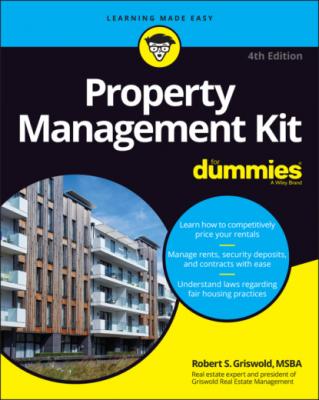Property Management Kit For Dummies. Robert S. Griswold
Чтение книги онлайн.
Читать онлайн книгу Property Management Kit For Dummies - Robert S. Griswold страница 19
 need to succeed as a residential rental property manager.
need to succeed as a residential rental property manager.
You need to be fair, firm, and friendly to all rental prospects and tenants. Treat everyone impartially, and remain patient and calm under stress. Be determined and unemotional in enforcing rent collection and your policies and rules. Maintain a positive attitude through it all. The job isn’t as simple as it seems, is it?
Even if you didn’t answer all the questions in this section with an enthusiastic “yes,” you may still make a good rental property manager if you’re prepared to be flexible and to learn from your property management experiences. Some of the best property managers graduated from the school of hard knocks.
Chapter 3
Managing Your Residential Property Yourself or Hiring a Pro
IN THIS CHAPTER
The late-night cable and online real estate gurus can make real estate investing sound so simple. But a prime location at the right price isn’t all you need. The other key to success in real estate is having a well-managed property.
Initially, you may try to manage your residential rental property yourself, particularly if you have a single-family rental home or condo or even a small, multifamily rental property such as a duplex, triplex, or fourplex. That’s why I spend time in this chapter guiding you through the pros and cons of managing your own property (as opposed to hiring a pro to do it for you).
If you’re like most owners, though, at some point you’ll consider hiring a professional property management firm, which is why I also give you some tools for evaluating property management companies, from the services they offer to the fees they charge. I explain the importance of the big three traits to look for — experience, qualifications, and credentials — and reveal some of the common tricks management companies use to generate additional income that aren’t in your best interest.
Managing Your Rental Yourself
With your first rental, you’ll probably do all the work yourself: painting, cleaning, making repairs, advertising, fielding all inquiries, showing the unit, screening the applicants, completing all the paperwork, collecting rent, handling any complaints or concerns, and paying bills. This scenario certainly has its advantages, but it has its disadvantages too. Use the information in the following sections to help you decide whether you want to go it alone or hire a pro. (If you decide to do the latter, check out “Exploring Professional Management” later in this chapter for the scoop on working with a professional management company.)
The advantages
If you have the right traits for managing property (see Chapter 2 to help determine whether you do), if you have the time, and if you live reasonably close to your property, you should definitely manage it yourself. Here are some advantages of keeping direct control of the management of your rental property:
You save on a monthly management fee. If you purchase a single-family rental home or condo as an investment property, you most likely won’t be able to generate enough money to pay for a professional property manager and make a profit — at least not right away.
You save on maintenance costs. You decide who does the repair work and who mows the lawn. Doing your own maintenance or yard work is usually a good idea; if you hire someone else to do it for you, the cost can devour your monthly cash flow in a hurry.
No one cares as much about your investment as you do. You are always going to be the one who’s most dedicated to achieving the best results from your rental investment efforts. Property managers are professionals, but their retirement and future wealth aren’t riding on the success of your investment.
The drawbacks
If you’re just starting in the world of property management, you may be thinking of it as a part-time venture — something you’ll do in addition to your day job. After all, rent collection is just once per month, and what else could possibly be required? If that sounds like you, be sure to check out the following list of the cons of self-managing rental property:
You can damage or interfere with your day job. If you’re a higher-income, full-time professional, rushing off on weekdays to handle some minor crisis at your rental unit is not only impractical, but can also be downright damaging to your career. Most employers or clients have little tolerance for your need to handle the responsibilities of rental-property ownership, particularly when the demands are often unpredictable and unscheduled.
You can spend far too much time. If you earn your living from something other than managing your rental property, managing that property may not be worth your valuable time. Rental management can take up more time than you anticipate,